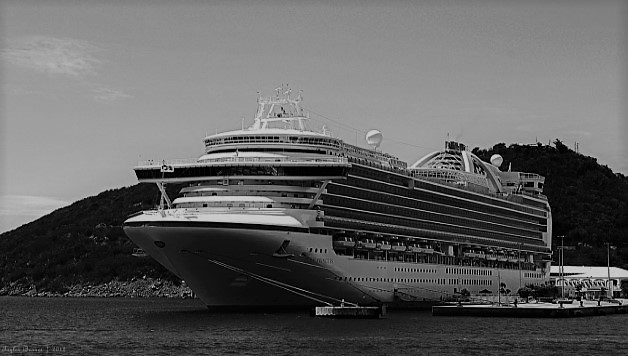The Federal Court of Australia has recently dismissed an application to stay part of a class action commenced on behalf of passengers aboard the Ruby Princess during its ill-fated voyage in early 2020.
The significance of the decision lies in the fact that it is the first in Australia to consider the enforceability of a class action waiver clause. In the view of Stewart J, the clause in question — which purported to prevent passengers from participating in any class or representative action against the carrier — was void as an unfair contract term under s 23 of the Australian Consumer Law (ACL).
Also of interest is Stewart J’s examination of whether there existed “strong reasons” to refuse the stay application in the face of an exclusive jurisdiction clause in favour of certain specified courts in the United States. With reference to the Full Court of the Federal Court’s recent decision in Epic v Apple, his Honour held that there were public policy considerations in favour of passengers’ claims brought under the ACL being heard in Australian courts, not least due to the desirability of the normative standards and remedies of the ACL being interpreted and applied by an Australian court rather than a US court.
Background
In March 2020, the now infamous passenger ship, the Ruby Princess, departed Sydney and embarked on an ill-fated voyage to New Zealand. Following an outbreak of COVID-19 on-board, the ship returned to Sydney and controversially disembarked some 2,700 passengers, at least 900 of whom later tested positive.
In July 2020, a passenger, Ms Karpik, commenced a representative proceeding in the Federal Court against Princess Cruise Lines Ltd (Princess), the owner and operator of the ship, and Carnival plc (Carnival), the ship’s time charterer. Ms Karpik alleged that Princess and Carnival had:
- engaged in false, misleading or deceptive conduct contrary to ss 18 and 29(1)(b) of the ACL;
- breached certain consumer guarantees in ss 60 and 61 of the ACL; and
- committed the tort of negligence.
Each passenger was said to have agreed to one of three categories of contractual terms and conditions. Approximately 700 passengers were said to be subject to the so-called “US terms and conditions”. Those terms and conditions included a class action waiver clause, which relevantly provided that:
WAIVER OF CLASS ACTION: This passage contract provides for the exclusive resolution of disputes through individual legal action on your own behalf instead of through any class or representative action. Even if the applicable law provides otherwise, you agree that any arbitration or lawsuit against carrier whatsoever shall be litigated by you individually and not as a member of any class or as part of a class or representative action, and you expressly agree to waive any law entitling you to participate in a class action.
The US terms and conditions also included an exclusive jurisdiction clause, which relevantly provided that any claim or dispute was to be litigated only in the United States District Courts for the Central District of California in Los Angeles or in courts located in Los Angeles County (US Courts).
In June 2021, Princess and Carnival filed an interlocutory application seeking, among other things, an order that the claims brought by those passengers subject to the US terms and conditions (US sub-group members) be stayed by reason of the operation of the class action waiver clause and the exclusive jurisdiction clause. The stay application was opposed by Ms Karpik on a number of bases, including that:
- the clauses did not apply because they had not been validly incorporated into the US terms and conditions, were void as unfair contract terms under s 23 of the ACL, and the class action waiver clause was unconscionable under s 21 of the ACL; and
- the Court did not have the power to stay an ACL claim, or alternatively that there was no basis for a stay.
The enforceability of the class action waiver clause and the exclusive jurisdiction clause
Notwithstanding the finding by Stewart J that neither the class action waiver clause nor the exclusive jurisdiction clause was validly incorporated into the US terms and conditions, his Honour proceeded to consider whether the clauses constituted unfair contract terms under s 23 of the ACL. Generally, a term of a standard form contract is considered unfair under this provision if it:
- would cause a significant imbalance in the parties’ rights and obligations arising under the contract;
- is not reasonably necessary to protect the legitimate interests of the party who would be advantaged by the term; and
- would cause detriment (financial or otherwise) to a party if the term were to be applied or relied on.
Exclusive jurisdiction clause
With respect to the exclusive jurisdiction clause, Stewart J was not satisfied that the clause was unfair for two reasons. First, his Honour did not consider that the clause caused an imbalance, let alone a significant imbalance, in the parties’ rights, as it merely restricted the fora in which passengers could enforce their rights, rather than altogether preventing their ability to do so. Secondly, his Honour considered that it was entirely legitimate for multinational companies such as Princess to seek to avoid litigation in multiple jurisdictions.
Class action waiver clause
His Honour took a different view with respect to the class action waiver clause. His Honour was satisfied that the clause caused a significant imbalance in the parties’ rights, on the basis that it would limit the practical ability of a passenger to pursue claims which were otherwise “economically unviable” or “questionable to pursue” in an individual proceeding. His Honour also considered that the clause was not transparent for substantially the same reasons that it was found not to have been incorporated into the US terms and conditions — that is to say, the clause was “onerous or unusual” and served to limit passengers’ rights, and no particular attention was drawn to it. Accordingly, his Honour held that had the clause been incorporated into the US terms and conditions, he would have found it to be void as an unfair contract term under s 23 of the ACL.
Further, whilst his Honour found that the class action waiver clause was not unconscionable under s 21 of the ACL, the finding was made on an evidentiary, rather than a factual, basis. In fact, his Honour noted that s 21 could “in principle, apply” to the circumstances of the case, but surmised that it was not open to make a finding of that nature given the insufficiency of the evidence tendered by Ms Karpik in relation to the allegation. This leaves open the possibility that similar clauses may in fact fall foul of s 21 where they operate “to render the substantive contractual rights illusory and deny access to justice”.
Although this finding is noteworthy for its novelty, and in light of the frequency with which class action waiver clauses form part of standard form consumer contracts, it is to be observed that Stewart J’s conclusion is — strictly speaking — obiter dicta, and was heavily qualified by his Honour in light of the fact that the issue was dealt with on an interlocutory basis and was not the subject of fully developed submissions by the parties. Nevertheless, his Honour’s consideration of the clause is likely to provide a useful starting point for the assessment of similar or analogous clauses in the future.
Were there strong reasons to refuse the stay and not enforce the exclusive jurisdiction clause?
Although it was not strictly necessary to do so given his Honour’s finding that the clauses were not validly incorporated, Stewart J went on to consider whether the claims by US sub-group members should be stayed by reason of the exclusive jurisdiction clause, in the event his Honour was incorrect about its incorporation into the terms and conditions.
In his Honour’s view, there were three “strong reasons” in favour of refusing the stay and not enforcing the exclusive jurisdiction clause.
First, his Honour considered that staying the claims of US sub-group members would result in a fracturing of the litigation, as practically identical claims would proceed in the Federal Court in a representative proceeding and in a US Court in individual proceedings. This, his Honour noted, would be wasteful of the parties’ resources and of judicial resources, and the prospective of conflicting outcomes in different courts risked bringing the administration of justice into disrepute.
Secondly, his Honour considered that there were public policy considerations in favour of the US sub-group members’ claims under the ACL being heard in Australian courts, with reference to the recent decision of the Full Court of the Federal Court in Epic v Apple. According to his Honour, those policy considerations included the fact that:
the various provisions of the ACL articulate standards of commercial behaviour that are expected of corporations undertaking trade and commerce in Australia and they offer protections and remedies to consumers in Australia. The ACL thus sets normative standards for commercial conduct in Australia, and it provides remedies and protections when those standards are not observed. It is desirable, although not mandatory, that the ACL’s normative standards and remedies are interpreted and applied by an Australian court.
His Honour also thought it significant that a judgment of a US Court with respect to the ACL claims would be unlikely to contribute to Australian jurisprudence, in addition to the risk that the meaning of the provisions of the ACL would be “lost in translation” given they would be interpreted by a US Court through the prism of expert evidence.
Thirdly, even though his Honour found that the ACL claims could be brought in the US Court, given his Honour’s conclusion with respect to the unenforceability of the class action waiver clause under Australian law, the US sub-group members would have a significant juridical advantage if the matter proceeded in the Federal Court, because the US sub-group members would be able to participate in a representative proceeding in Australia but not in the US.
Key takeaways
As the first in Australia to consider the enforceability of a class action waiver clause, the decision of Stewart J is likely to provide useful guidance for future judicial consideration of similar or analogous clauses challenged under the provisions of the ACL. However, the qualified nature of his Honour’s findings means that it will fall to future cases to more definitively clarify whether such clauses ought properly be characterised as “unfair” or “unconscionable”, and thereby rendered unenforceable.
The decision also provides further confirmation following the decision of the Full Court of the Federal Court in Epic v Apple that there are strong policy considerations in favour of claims made under the ACL being heard in Australia courts, and that such policy considerations will be highly relevant to the question of whether or not there are strong reasons to refuse a stay and not enforce an exclusive jurisdiction clause.
As for the next port of call in the proceeding, Carnival and Princess have filed an application for leave to appeal Stewart J’s decision to the Full Court of the Federal Court. In a recent case management hearing, Allsop CJ granted leave to appeal and listed the hearing of the appeal before the Full Court on a date to be fixed in February 2022. Depending on how the appeal fares, the Ruby Princess parties will then chart a course for trial in October 2022.
This article was written by James Keeves and Grace Saltearn.
Ruby Princess at Titanic Quarter Belfast / Creative Commons / CC BY 2.0 / remixed to black and white and resized







